Abstract
OBJECTIVE: To assess whether advance directives influence resource use by hospitalized patients. DATA SOURCES: A systematic search of computerized medical databases, reference lists from relevant articles, and personal files was conducted to identify studies examining the association between advance directives and resource use. STUDY SELECTION: Primary studies assessing the effect of advance directives on hospital resource use were selected if they had a clear quantitative measure of hospital resource use, hospitalized patients as a study population, a control group for comparison, and a description of the advance directive being studied. Data on the following topics were abstracted from studies meeting inclusion criteria: study methods and design, resource use, source of financial data, description of advance directive, population size and composition, length of assessment. SYNTHESIS: Six studies met inclusion criteria. Three retrospective studies showed significant reductions in resource use associated with documentation of advance directives while three prospective studies (two randomized, one not randomized) showed no association between advance directives and reduced resource use. Studies were limited to narrowly defined patient populations in US tertiary care hospitals. CONCLUSIONS: Little evidence supports the hypothesis that advance directives reduce resource use by hospitalized patients. Some retrospective studies have shown savings, but their conclusions are weakened by shortcomings in study design. Prospective trials, which have better experimental methods, have demonstrated no evidence of cost savings with the use of advance directives.
Full text
PDF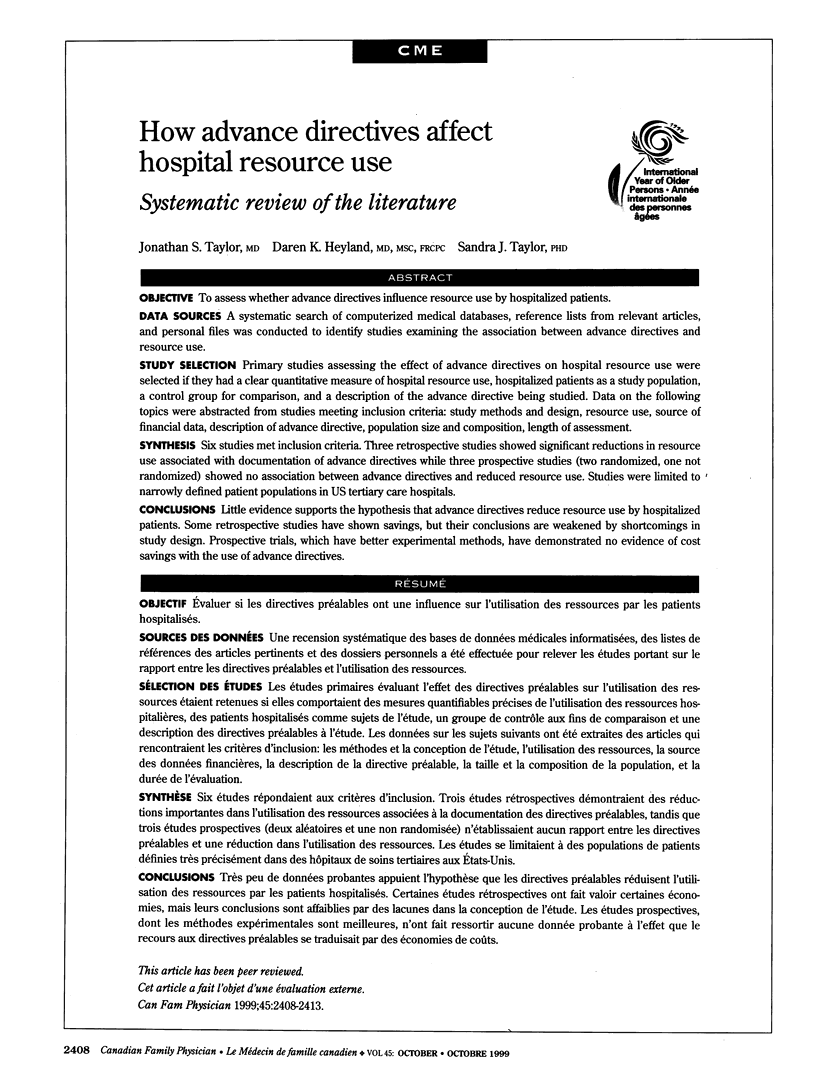
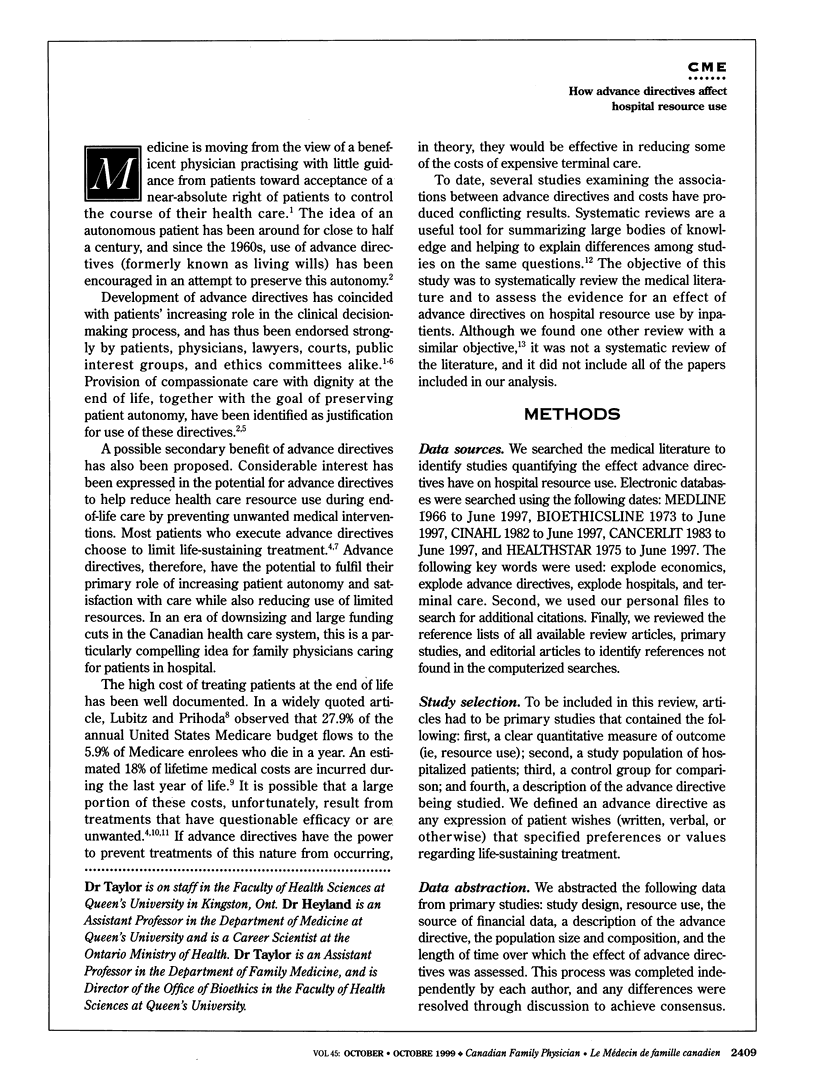
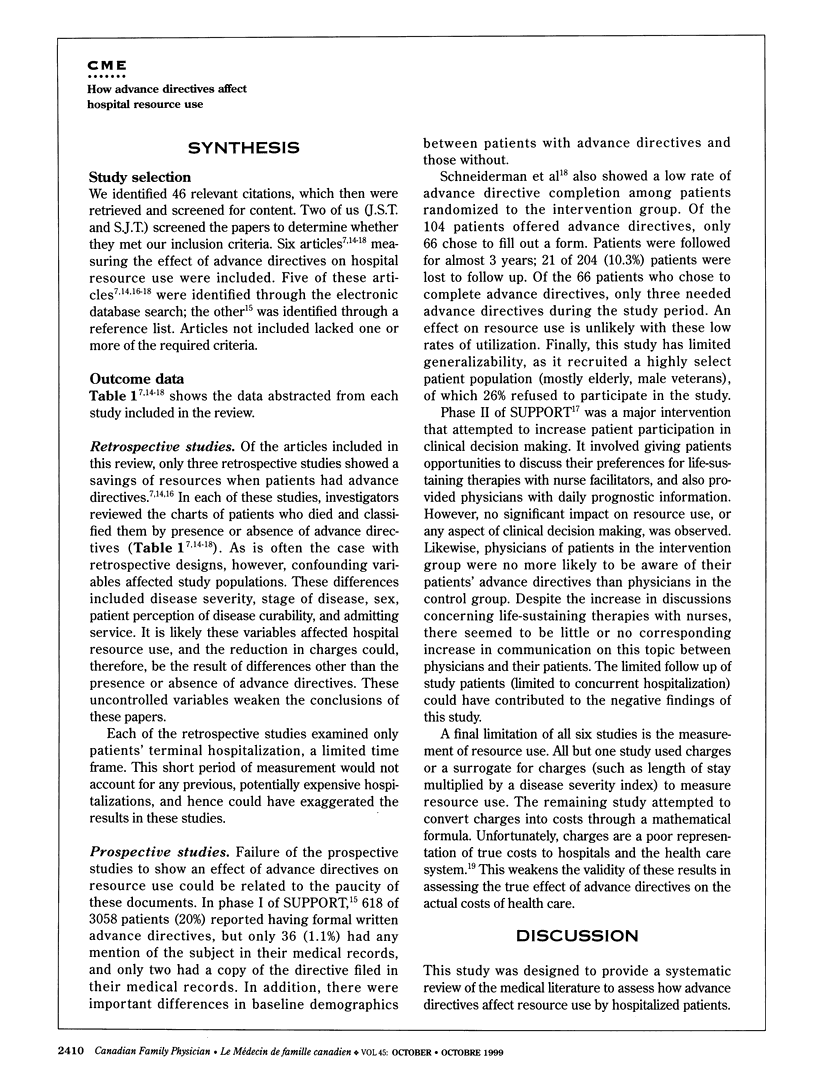
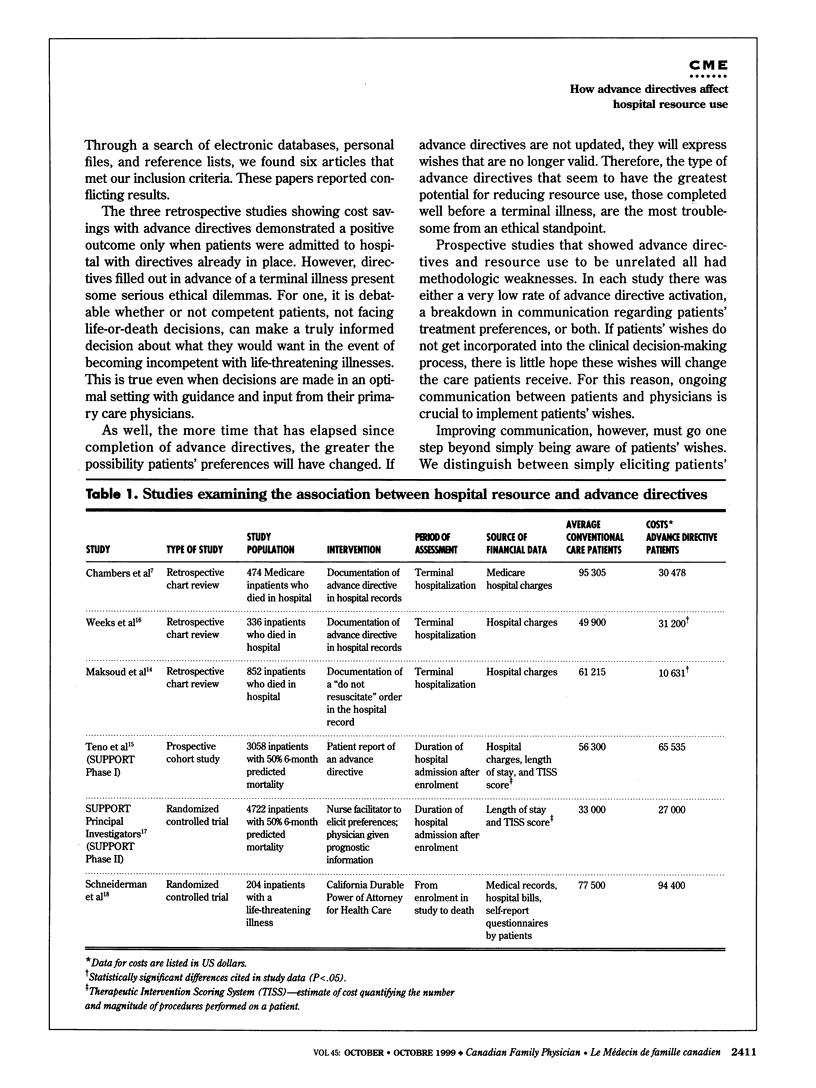
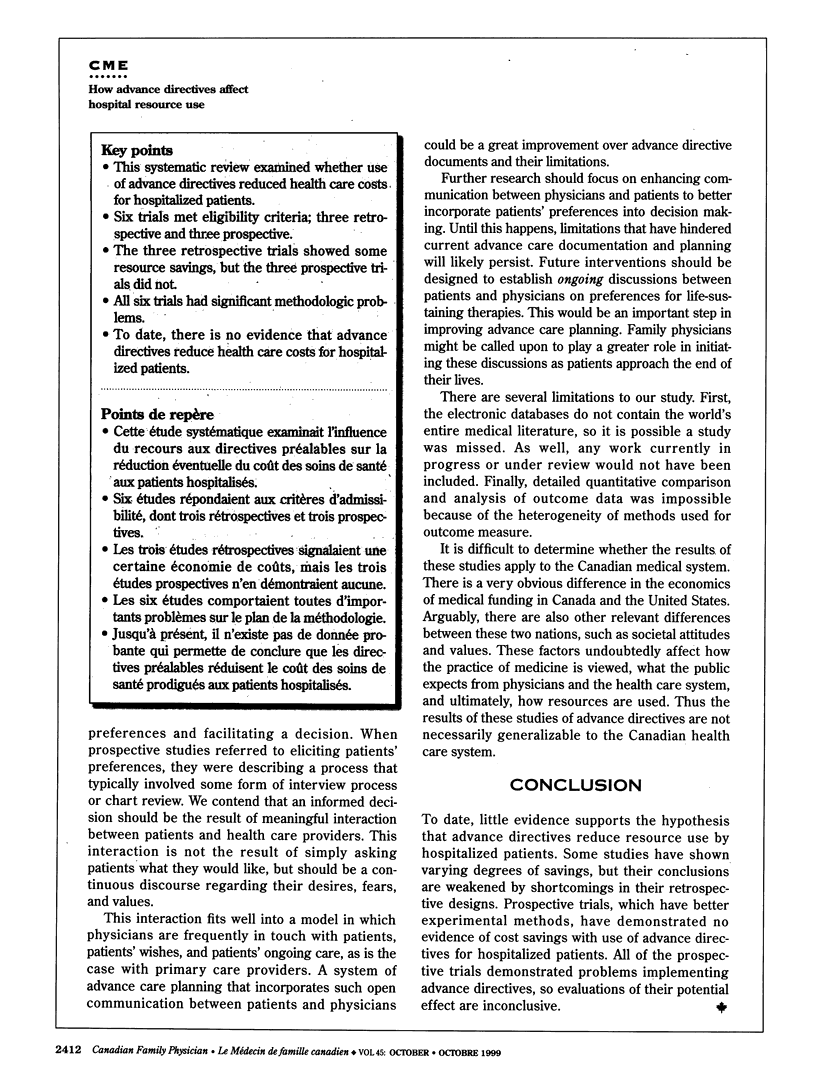
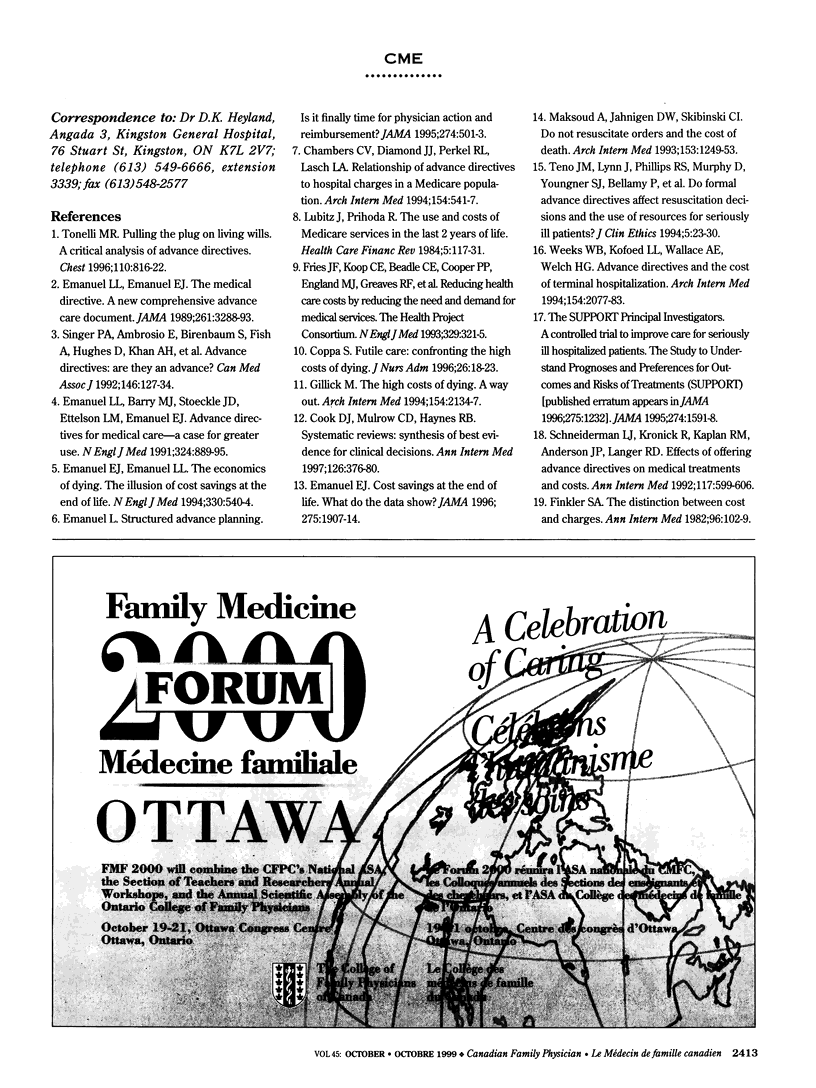
Selected References
These references are in PubMed. This may not be the complete list of references from this article.
- Advance directives: are they an advance? Advance Directives Seminar Group, Centre for Bioethics, University of Toronto. CMAJ. 1992 Jan 15;146(2):127–134. [PMC free article] [PubMed] [Google Scholar]
- Chambers C. V., Diamond J. J., Perkel R. L., Lasch L. A. Relationship of advance directives to hospital charges in a Medicare population. Arch Intern Med. 1994 Mar 14;154(5):541–547. [PubMed] [Google Scholar]
- Cook D. J., Mulrow C. D., Haynes R. B. Systematic reviews: synthesis of best evidence for clinical decisions. Ann Intern Med. 1997 Mar 1;126(5):376–380. doi: 10.7326/0003-4819-126-5-199703010-00006. [DOI] [PubMed] [Google Scholar]
- Coppa S. Futile care: confronting the high costs of dying. J Nurs Adm. 1996 Dec;26(12):18–23. doi: 10.1097/00005110-199612000-00007. [DOI] [PubMed] [Google Scholar]
- Emanuel E. J. Cost savings at the end of life. What do the data show? JAMA. 1996 Jun 26;275(24):1907–1914. [PubMed] [Google Scholar]
- Emanuel E. J., Emanuel L. L. The economics of dying. The illusion of cost savings at the end of life. N Engl J Med. 1994 Feb 24;330(8):540–544. doi: 10.1056/NEJM199402243300806. [DOI] [PubMed] [Google Scholar]
- Emanuel L. L., Barry M. J., Stoeckle J. D., Ettelson L. M., Emanuel E. J. Advance directives for medical care--a case for greater use. N Engl J Med. 1991 Mar 28;324(13):889–895. doi: 10.1056/NEJM199103283241305. [DOI] [PubMed] [Google Scholar]
- Emanuel L. L., Emanuel E. J. The Medical Directive. A new comprehensive advance care document. JAMA. 1989 Jun 9;261(22):3288–3293. doi: 10.1001/jama.261.22.3288. [DOI] [PubMed] [Google Scholar]
- Emanuel L. Structured advance planning. Is it finally time for physician action and reimbursement? JAMA. 1995 Aug 9;274(6):501–503. doi: 10.1001/jama.274.6.501. [DOI] [PubMed] [Google Scholar]
- Finkler S. A. The distinction between cost and charges. Ann Intern Med. 1982 Jan;96(1):102–109. doi: 10.7326/0003-4819-96-1-102. [DOI] [PubMed] [Google Scholar]
- Fries J. F., Koop C. E., Beadle C. E., Cooper P. P., England M. J., Greaves R. F., Sokolov J. J., Wright D. Reducing health care costs by reducing the need and demand for medical services. The Health Project Consortium. N Engl J Med. 1993 Jul 29;329(5):321–325. doi: 10.1056/NEJM199307293290506. [DOI] [PubMed] [Google Scholar]
- Gillick M. The high costs of dying. A way out. Arch Intern Med. 1994 Oct 10;154(19):2134–2137. [PubMed] [Google Scholar]
- Lubitz J., Prihoda R. The use and costs of Medicare services in the last 2 years of life. Health Care Financ Rev. 1984 Spring;5(3):117–131. [PMC free article] [PubMed] [Google Scholar]
- Maksoud A., Jahnigen D. W., Skibinski C. I. Do not resuscitate orders and the cost of death. Arch Intern Med. 1993 May 24;153(10):1249–1253. [PubMed] [Google Scholar]
- Schneiderman L. J., Kronick R., Kaplan R. M., Anderson J. P., Langer R. D. Effects of offering advance directives on medical treatments and costs. Ann Intern Med. 1992 Oct 1;117(7):599–606. doi: 10.7326/0003-4819-117-7-599. [DOI] [PubMed] [Google Scholar]
- Teno J. M., Lynn J., Phillips R. S., Murphy D., Youngner S. J., Bellamy P., Connors A. F., Jr, Desbiens N. A., Fulkerson W., Knaus W. A. Do formal advance directives affect resuscitation decisions and the use of resources for seriously ill patients? SUPPORT Investigators. Study to Understand Prognoses and Preferences for Outcomes and Risks of Treatments. J Clin Ethics. 1994 Spring;5(1):23–30. [PubMed] [Google Scholar]
- Tonelli M. R. Pulling the plug on living wills. A critical analysis of advance directives. Chest. 1996 Sep;110(3):816–822. doi: 10.1378/chest.110.3.816. [DOI] [PubMed] [Google Scholar]
- Weeks W. B., Kofoed L. L., Wallace A. E., Welch H. G. Advance directives and the cost of terminal hospitalization. Arch Intern Med. 1994 Sep 26;154(18):2077–2083. [PubMed] [Google Scholar]



